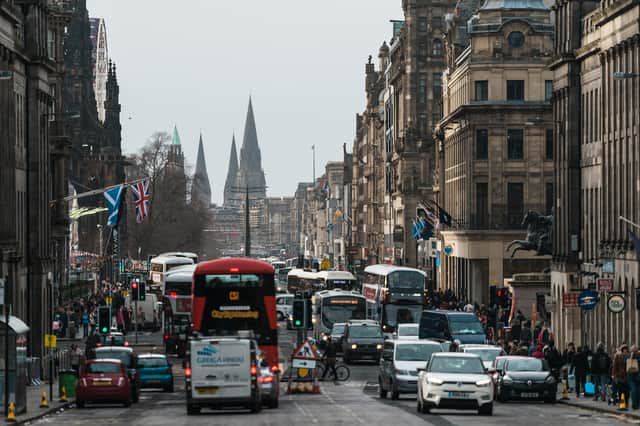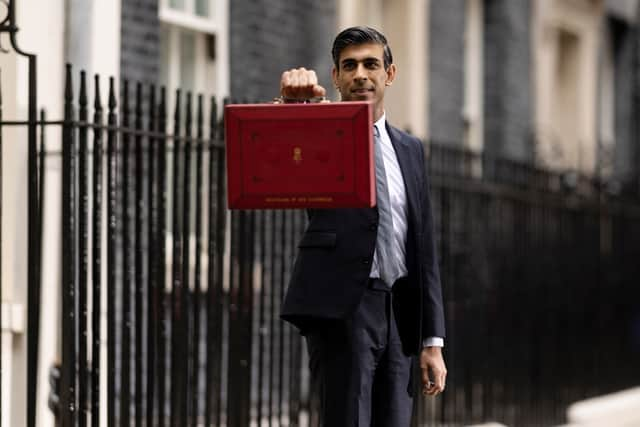Budget 2021: what Rishi Sunak’s Budget means for drivers, including fuel duty freeze and EV grants


Chancellor Rishi Sunak has confirmed in his 2021 Budget that the fuel duty freeze will continue for another 12 months amid concerns over the current cost of fuel.
Mr Sunak’s speech to the House of Commons revealed a series of sweeping tax changes which he claimed would help address rising living costs while helping the UK economy recover.
Advertisement
Hide AdAdvertisement
Hide AdHis announcements focused on investment and tax changes for sectors from the public sector and construction to aviation and the hospitality industry.
But he also made time in his speech to confirm that once again fuel duty will remain at its current level of 57.95p per litre.
Mr Sunak said that with petrol prices at record highs he was “not prepared to add to the squeeze on families and small businesses".
Fuel prices have soared over the last nine months as the wholesale price of oil has more than doubled, and last week petrol reached an unprecedented average of 142.94p per litre, according to analysis by the RAC.
Advertisement
Hide AdAdvertisement
Hide AdDiesel costs have also risen to 146.89p but have not yet reached the record high of 151p, recorded in 2012.
Mr Sunak said the continuation of the fuel duty freeze for the 12th consecutive year would amount to saving of £8 billion for drivers over the next five years.


The Petrol Retailers’ Association welcomes the announcement.
Its chairman, Brian Madderson, commented: “With pump prices at an eight year high, PRA has been lobbying Government and the Treasury, in particular outlining the potentially damaging effects on the economy and household budgets of even an inflation-linked rise, so it is positive to hear the Chancellor’s commitment.
Advertisement
Hide AdAdvertisement
Hide AdThe RAC’s fuel spokesman Simon Williams welcomed the continued freeze on the levy but said Mr Sunak could have gone further to support drivers struggling with soaring costs.
He said: “With pump prices at record highs, now would have been the worst possible time to change tack and hike up costs still further at the forecourt. If duty had gone up, RAC data suggests the average price of a litre of petrol could have reached 147p,and diesel an eye-watering 150p.
“But we’re disappointed he did not provide some respite for drivers at the pumps. As VAT is charged on the final cost at the pumps, a temporary cut in VAT to motor fuels would have benefitted drivers immediately at a time when filling up the car is hurting household budgets more than ever before.”
Steve Huntingford, editor at What Car? welcomed the duty freeze but said the Chancellor had failed to address the looming black hole in transport-related income.
Advertisement
Hide AdAdvertisement
Hide AdHe said: “Something the Chancellor failed to touch on is how Vehicle Excise Duty for cars and vans will have to change in the future. With electric vehicles the fastest growing new car segment, the Treasury is facing an increasing hole in its budget due to the currently tax-exempt electric vehicles. This is something the Government will need to address fast, as the 2030 deadline to end the sale of petrol and diesel cars is looming closer. “
The Budget statement and Spending Review also confirmed previously announced plans for electric vehicle funds and investment in charging infrastructure.
£620 million is being set aside as part of the Government’s net zero ambition.
That money will be invested in on-street public charging in residential areas, to help drivers without private parking access EV chargers at home.
Advertisement
Hide AdAdvertisement
Hide AdIt will also be used for “targeted” plug-in car grants. Details of these have not been confirmed but it is thought that it could mean an end to the current grant, which is available to all buyers of EVs costing less than £35,000.
Mr Sunak also announced a £21bn investment in road infrastructure to include extra funds for road maintenance and investment in cycling infrastructure.
Comment Guidelines
National World encourages reader discussion on our stories. User feedback, insights and back-and-forth exchanges add a rich layer of context to reporting. Please review our Community Guidelines before commenting.